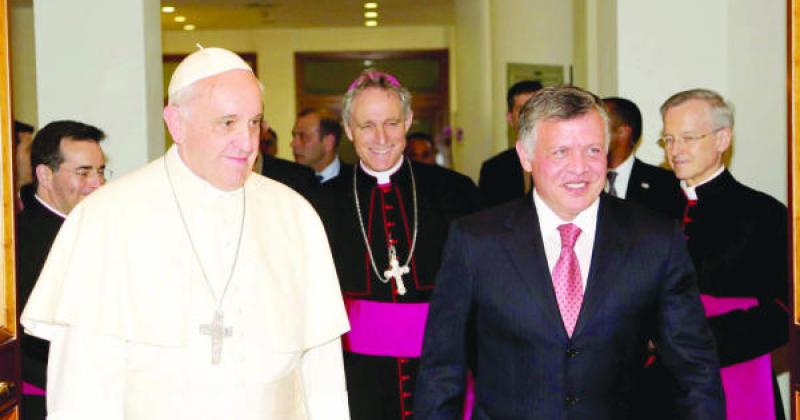The forthcoming fourth Pontiff visit to Jordan is but a reward to Jordan’s ongoing efforts to consolidate interfaith coexistence and harmony. But, is Jordan, people and leadership, up to His Holiness’ reward? Are the Jordanian people, relevant authorities and the civil society equally reciprocating the Pontiff’s efforts in bridging the gap between the monotheistic faiths, in addition to advocating number of issues embraced specifically by HH Pope Francis?
But are these issues advocated by HH?
On the occasion of Time magazine presenting Pope Francis as the Person of the Year 2013, in an article titled “Pope Francis, the People’s Pope” Howard Chua-Eoan and Elizabeth Dias wrote
Francis has made society’s most vulnerable—the sick, the elderly, immigrants and children—the focus of his ministry... In a matter of months, Francis has elevated the healing mission of the Church—the Church as servant and comforter of hurting people in an often harsh world… the first Pope to choose as his namesake Francis of Assisi, the 13th century patron saint of the poor… He was a peacemaker, the first Catholic leader to travel to Egypt to try to end the Crusades. He placed mercy at the core of his life.
Another central issue adopted by Pope Francis was underlined by Ileana Argentin, a wheel-chaired Italian Parliament member campaigner for the rights of the disabled, who said
Pope Francis has brought down ‘wall of prejudice’ against the disabled (Wooden, CatholicHerald.co.uk, 13/1/214).
The great humility, compassion and tolerance of Pope Francis was best translated on the Holy Thursday this year when HH, challenging all forms of differences and inequalities, washed the feet of twelve young and elderly disabled at the St. Mary of Providence Center among them were four women and a Muslim.
And with his call for peace in the world in the face of another Middle East war, Pope Francis has established himself clearly as a world leader and positioned himself as a peacemaker (Wilkinson, Tablet, 11/9/2013). Thus, Pope Francis preserves the legacy of his predecessors in serving peace not least the contribution of HH Pope Benedict XVI who visited Lebanon amid volatility to deliver the apostolic guidance on peace and love and appealed the world to send peace and not arms to Syria, complementing the steps of his predecessor HH Pope John II, the Reconciler.
On January 2014, in his message for the World the Day of Peace, Pope Francis further expanded his advocacy of peace and introduced a recipe for practising peace while integrating it in other relevant values by stating
When we break free from indifference and see ourselves as members of one human family, we can truly “encounter” one another and build peace.
Thus issues pertinent the most venerable segments of the society (the sick, the disabled, the immigrants, the elderly, the children), women and peace are the concerns of Pope Francis in addition to his major concern of interfaith coexistence, tolerance and compassion.
To verify Jordan’s eligibility to receive such a reward of fourth Pontiff visit, it becomes imperative to identify how Jordan, people, authorities and civil society, has positioned itself regarding these issues promoted by HH.
Despite Jordan being a respectful and credible destination for medical care, Jordan’s attendance to its sick is far from perfect despite the accessibility of public health services by all. However, serious attempts are carried out to include all Jordanians in good health care system.
The rights and services provided to the disabled can be best verified through the adopted laws including those which protect the employment rights of the disabled and the presence of societies which empower the disabled and dedicate efforts for their integration and accessibility. However, the biggest challenge remains rehabilitating the society at large to better accommodate the disabled and immune this sector from corruption and opportunist outside the profession corrupts who are not hesitant even to use the most fragile segments of the society for self-benefits.
As with regard immigrants and since its inception as a state, Jordan continues to represent a safe haven for immigrants and expands its efforts to meet the components of human security of its own citizens to respond the needs of waves of immigrations.
Despite presence of laws preserving their rights, the elderly, the children and the women are the poor areas in Jordan’s achievements where the society at large with its cultural orientation is the key culprit of these shortcomings through cultural impediments, societal comportments and poor enforcement of the laws.
Regarding the key component of Pope Francis convictions and practices, peace and interfaith tolerance and coexistence, Jordan partnership with UN in serving domestic and international peace is well documented. While concerning bridging faiths and promoting compassion and tolerance, humane and compassionate political-cultural environment is present in Jordan.
However it is indeed disappointing that the appeal of this author (Arab Alyawm, 28/4/2104) not to have this compassionate environment abducted, as it was the case with other tolerant societies like Syria, through rehabilitating domestic extremist members and immunizing Jordan and the Jordanian society against destructive external infiltration and extremist figures who can easily manipulate the youth and instigate animosity and violence remained unheeded.
The Messenger of Peace and Humanity is to visit a Land of Peace and Humanity. However further initiatives are anticipated from Jordan to become further eligible to receive such a cause-oriented visitor of great values and ethics through foremost promoting equality in acquired rights by the two faiths followers starting with having Christianity taught to Christian students by Christian teachers in public schools.
